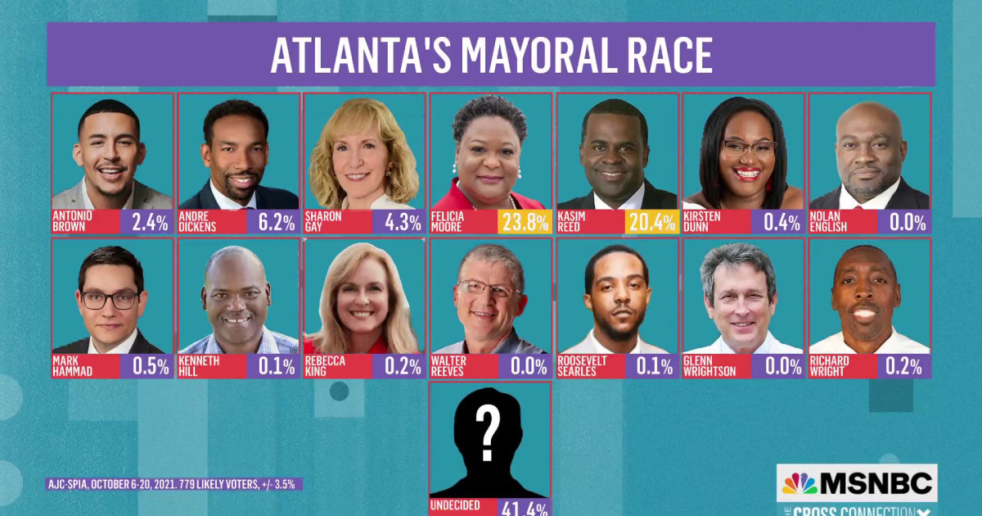With Halloween wrapping up and the winter holidays right around the corner, many people would not have politics on their mind. The presidential election occurred last year, and most congressional elections will not roll back around until 2022.
However, despite being an off year, the highly influential Atlanta mayoral elections occurred on Nov. 2. While the campaign focused mostly on the politics surrounding the city of Atlanta, whoever goes on to win the election will more than likely play a large role in the future of students attending the Institute.
There were five main contenders for the Atlanta Mayoral position: Felicia Moore, Andre Dickens, Kasim Reed, Sharon Gay and Antonio Brown.
The Atlanta mayoral election, like the senatorial elections, require the winning candidate to receive more than 50% of the vote in order to win.
Should no candidate receive a majority of the votes, then the top two candidates move into a runoff election, which is what happened this election cycle.
While former Atlanta mayor Kasim Reed was favored to move on to the election runoff with Felicia Moore, Tech alumnus Andre Dickens made a surprisingly strong showing, whittling away at an initially strong lead by Reed and joining Felicia Moore in the runoff competition on Nov. 30.
The Dickens campaign declared victory at approximately 1 a.m. on Nov. 3, saying: “They said our campaign was over. They said my council career was dead. But you know what we did? We fought every single day for city … so be careful. Be very careful of counting us out again.”
The election turnout was significantly lower for this election cycle, as expected due to being an off-year, and many students did not see it as being as important of an election to participate.
When asked whether or not he participated in the election, Eric Hu, third-year BME, responded, “No, I voted in the presidential election, but I didn’t vote this cycle. I thought it was quite accessible as far as being able to vote, but I didn’t care too much about it this time around.”
There were not many reasons for Tech students to make voting a priority this election. Most notably, having class on a Tuesday more than likely made it challenging for students to turn out. In addition, the candidates did not spend too much time campaigning on campus, outside of a panel event hosted by SGA. Many students were not fully aware of all of the options in the mayoral election.
“Honestly, I knew that there was a mayoral election occurring, but I had no idea who the candidates were” said Hu.
“They really didn’t do that much in terms of reaching out to us, so I wasn’t all that sure who was running or what their platforms were.”
While the spotlight has been on the national election field as a predictor of next year’s all-important congressional elections, the candidates in Atlanta ran as unaffiliated and focused their election campaigning on local issues of importance to the metro-Atlanta area.
Crime was a major talking point, with almost every candidate vowing to improve the policing system and work to lower crime.
Infrastructure and homelessness also shot to the top of voter priorities, with many candidates vowing to address the issues in different ways.
The runoff elections will be the next phase of the election. Moore and Dickens will likely shift their campaign to pushing out the vote.
Runoff elections historically have a significantly lower voter turnout rate than their election day counterparts, which was seen last January with the senatorial runoff elections.
With the added factor of this year being an off-cycle year, there is little doubt that getting voters to show up to the polls one more time will be the biggest challenge of these candidates’ journey towards the mayorship. Campaigning will continue through the end of November.
With a diversifying south that has increasingly been seen as the next political battleground, the mayorship is becoming a bellwether for the trajectory of southern politics as a whole.
If you voted in the election on Nov. 2, then voters are already eligible to return on Nov. 30 to cast your vote for either Moore or Dickens.
Georgia voters can visit mvp.sos.ga.gov to check on their voter registration status and locate their polling location for the upcoming runoff election.
